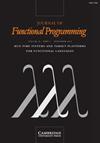用于建模、测试和执行分布式系统的协议组合器
IF 0.6
3区 计算机科学
Q4 COMPUTER SCIENCE, SOFTWARE ENGINEERING
引用次数: 1
摘要
摘要分布式系统很难进行正确的建模、测试、调试和教学。他们的教科书定义通常以复制状态机的形式给出,简洁明了,但如果天真地转换为可运行的实现,则容易引入编程错误。在这项工作中,我们介绍了分布式协议组合器(DPC),这是一个声明性编程框架,旨在弥合分布式系统的规范和可运行实现之间的差距,并促进它们的建模、测试和执行。DPC建立在最先进的逻辑思想之上,用于组合系统验证。DPC的贡献是一个新的程序级原语家族,它有助于从较小的组件构建更大的分布式系统,简化最常见的异步消息传递通信模式的使用,并为系统的测试和用户友好的动态验证提供机制。本文描述了框架设计背后的主要思想,并介绍了它在Haskell中的实现。我们通过一系列特征示例介绍了DPC,并在文献中的许多分布式协议中展示了它。本文扩展了我们之前的会议出版物(Andersen和Sergey,2019a),探索了协议的随机测试及其实现,并进行了一项额外的案例研究,证明了协议的有界模型检查。本文章由计算机程序翻译,如有差异,请以英文原文为准。
Protocol combinators for modeling, testing, and execution of distributed systems
Abstract Distributed systems are hard to get right, model, test, debug, and teach. Their textbook definitions, typically given in a form of replicated state machines, are concise, yet prone to introducing programming errors if naïvely translated into runnable implementations. In this work, we present Distributed Protocol Combinators (DPC), a declarative programming framework that aims to bridge the gap between specifications and runnable implementations of distributed systems, and facilitate their modeling, testing, and execution. DPC builds on the ideas from the state-of-the art logics for compositional systems verification. The contribution of DPC is a novel family of program-level primitives, which facilitates construction of larger distributed systems from smaller components, streamlining the usage of the most common asynchronous message-passing communication patterns, and providing machinery for testing and user-friendly dynamic verification of systems. This paper describes the main ideas behind the design of the framework and presents its implementation in Haskell. We introduce DPC through a series of characteristic examples and showcase it on a number of distributed protocols from the literature. This paper extends our preceeding conference publication (Andersen & Sergey, 2019a) with an exploration of randomized testing for protocols and their implementations, and an additional case study demonstrating bounded model checking of protocols.
求助全文
通过发布文献求助,成功后即可免费获取论文全文。
去求助
来源期刊

Journal of Functional Programming
工程技术-计算机:软件工程
CiteScore
1.70
自引率
0.00%
发文量
9
审稿时长
>12 weeks
期刊介绍:
Journal of Functional Programming is the only journal devoted solely to the design, implementation, and application of functional programming languages, spanning the range from mathematical theory to industrial practice. Topics covered include functional languages and extensions, implementation techniques, reasoning and proof, program transformation and synthesis, type systems, type theory, language-based security, memory management, parallelism and applications. The journal is of interest to computer scientists, software engineers, programming language researchers and mathematicians interested in the logical foundations of programming.
 求助内容:
求助内容: 应助结果提醒方式:
应助结果提醒方式:


